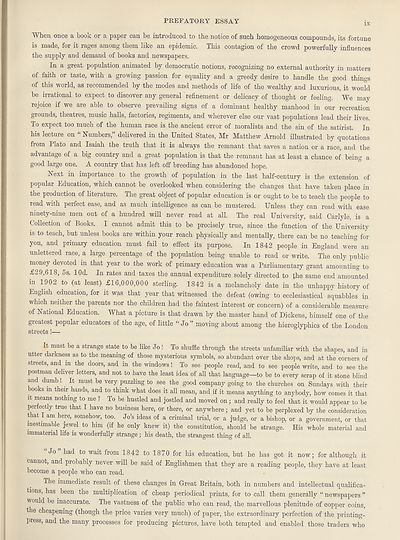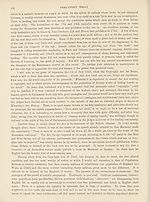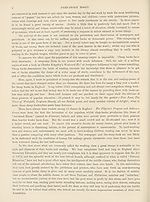New volumes of the Encyclopædia Britannica > Volume 30, K-MOR
(13) Page ix
Download files
Complete book:
Individual page:
Thumbnail gallery: Grid view | List view

PREFATORY ESSAY
ix
When once a book or a paper can be introduced to the notice of such homogeneous compounds, its fortune
is made, for it rages among them like an epidemic. This contagion of the crowd powerfully influences
the supply and demand of books and newspapers.
In a great population animated by democratic notions, recognizing no external authority in matters
of faith or taste, with a growing passion for equality and a greedy desire to handle the good things
of this world, as recommended by the modes and methods of life of the wealthy and luxurious, it would
be irrational to expect to discover any general refinement or delicacy of thought or feeling. We may
rejoice if we are able to observe prevailing signs of a dominant healthy manhood in our recreation
grounds, theatres, music halls, factories, regiments, and wherever else our vast populations lead their lives.
To expect too much of the human race is the ancient error of moralists and the sin of the satirist. In
his lecture on “ Numbers,” delivered in the United States, Mr Matthew Arnold illustrated by quotations
from Plato and Isaiah the truth that it is always the remnant that saves a nation or a race, and the
advantage of a big country and a great population is that the remnant has at least a chance of being a
good large one. A country that has left off breeding has abandoned hope.
IS ext in importance to the growth of population in the last half-century is the extension of
popular Education, which cannot be overlooked wdien considering the changes that have taken place in
the production of literature. The great object of popular education is or ought to be to teach the people to
read with peifect ease, and as much intelligence as can be mustered. Unless they can read with ease
ninety-nine men out of a hundred will never read at all. The real University, said Carlyle, is a
Collection of Books. I cannot admit this to be precisely true, since the function of the University
is to teach, but unless books are within your reach physically and mentally, there can be no teaching for
you, and primary education must fail to effect its purpose. In 1842 people in England were an
unlettered race, a large percentage of the population being unable to read or write. The only public
money devoted in that year to the work of primary education was a Parliamentary grant amounting to
£29,618, 5s. lOd. In rates and taxes the annual expenditure solely directed to the same end amounted
in 1902 to (at least) £16,000,000 sterling. 1842 is a melancholy date in the unhappy history of
English education, for it was that year that witnessed the defeat (owing to ecclesiastical squabbles in
which neither the parents nor the children had the faintest interest or concern) of a considerable measure
of National Education. What a picture is that drawn by the master hand of Dickens, himself one of the
greatest popular educators of the age, of little “Jo” moving about among the hieroglyphics of the London
streets !—
It must be a strange state to be like Jo! To shuffle through the streets unfamiliar with the shapes, and in
utter darkness as to the meaning of those mysterious symbols, so abundant over the shops, and at the corners of
streets, and in the doors, and in the windows! To see people read, and to see people write, and to see the
postman deliver letters, and not to have the least idea of all that language—to be to every scrap of it stone blind
and dumb! . It must be very puzzling to see the good company going to the churches on Sundays with their
ooks in their hands, and to think what does it all mean, and if it means anything to anybody, how comes it that
it means nothing to me ? To be hustled and jostled and moved on ; and really to feel that it would appear to be
perfectly true that I have no business here, or there, or anywhere; and yet to be perplexed by the consideration
that I am here, somehow, too. Jo’s ideas of a criminal trial, or a judge, or a bishop, or a government, or that
inestimable jewel to him (if he only knew it) the constitution, should be strange. His whole material and
immaterial life is wonderfully strange; his death, the strangest thing of all.
Jo had to wait from 1842 to 1870 for his education, but he has got it now; for although it
cannot, and probably never will be said of Englishmen that they are a reading people, they have at least
become a people who can read.
The immediate result of these changes in Great Britain, both in numbers and intellectual qualifica¬
tions, has been the multiplication of cheap periodical prints, for to call them generally “ newspapers ”
would be inaccurate. The vastness of the public who can read, the marvellous plenitude of copper coins,
the cheapening (though the price varies very much) of paper, the extraordinary perfection of the printing-
press, and the many processes for producing pictures, have both tempted and enabled those traders who
ix
When once a book or a paper can be introduced to the notice of such homogeneous compounds, its fortune
is made, for it rages among them like an epidemic. This contagion of the crowd powerfully influences
the supply and demand of books and newspapers.
In a great population animated by democratic notions, recognizing no external authority in matters
of faith or taste, with a growing passion for equality and a greedy desire to handle the good things
of this world, as recommended by the modes and methods of life of the wealthy and luxurious, it would
be irrational to expect to discover any general refinement or delicacy of thought or feeling. We may
rejoice if we are able to observe prevailing signs of a dominant healthy manhood in our recreation
grounds, theatres, music halls, factories, regiments, and wherever else our vast populations lead their lives.
To expect too much of the human race is the ancient error of moralists and the sin of the satirist. In
his lecture on “ Numbers,” delivered in the United States, Mr Matthew Arnold illustrated by quotations
from Plato and Isaiah the truth that it is always the remnant that saves a nation or a race, and the
advantage of a big country and a great population is that the remnant has at least a chance of being a
good large one. A country that has left off breeding has abandoned hope.
IS ext in importance to the growth of population in the last half-century is the extension of
popular Education, which cannot be overlooked wdien considering the changes that have taken place in
the production of literature. The great object of popular education is or ought to be to teach the people to
read with peifect ease, and as much intelligence as can be mustered. Unless they can read with ease
ninety-nine men out of a hundred will never read at all. The real University, said Carlyle, is a
Collection of Books. I cannot admit this to be precisely true, since the function of the University
is to teach, but unless books are within your reach physically and mentally, there can be no teaching for
you, and primary education must fail to effect its purpose. In 1842 people in England were an
unlettered race, a large percentage of the population being unable to read or write. The only public
money devoted in that year to the work of primary education was a Parliamentary grant amounting to
£29,618, 5s. lOd. In rates and taxes the annual expenditure solely directed to the same end amounted
in 1902 to (at least) £16,000,000 sterling. 1842 is a melancholy date in the unhappy history of
English education, for it was that year that witnessed the defeat (owing to ecclesiastical squabbles in
which neither the parents nor the children had the faintest interest or concern) of a considerable measure
of National Education. What a picture is that drawn by the master hand of Dickens, himself one of the
greatest popular educators of the age, of little “Jo” moving about among the hieroglyphics of the London
streets !—
It must be a strange state to be like Jo! To shuffle through the streets unfamiliar with the shapes, and in
utter darkness as to the meaning of those mysterious symbols, so abundant over the shops, and at the corners of
streets, and in the doors, and in the windows! To see people read, and to see people write, and to see the
postman deliver letters, and not to have the least idea of all that language—to be to every scrap of it stone blind
and dumb! . It must be very puzzling to see the good company going to the churches on Sundays with their
ooks in their hands, and to think what does it all mean, and if it means anything to anybody, how comes it that
it means nothing to me ? To be hustled and jostled and moved on ; and really to feel that it would appear to be
perfectly true that I have no business here, or there, or anywhere; and yet to be perplexed by the consideration
that I am here, somehow, too. Jo’s ideas of a criminal trial, or a judge, or a bishop, or a government, or that
inestimable jewel to him (if he only knew it) the constitution, should be strange. His whole material and
immaterial life is wonderfully strange; his death, the strangest thing of all.
Jo had to wait from 1842 to 1870 for his education, but he has got it now; for although it
cannot, and probably never will be said of Englishmen that they are a reading people, they have at least
become a people who can read.
The immediate result of these changes in Great Britain, both in numbers and intellectual qualifica¬
tions, has been the multiplication of cheap periodical prints, for to call them generally “ newspapers ”
would be inaccurate. The vastness of the public who can read, the marvellous plenitude of copper coins,
the cheapening (though the price varies very much) of paper, the extraordinary perfection of the printing-
press, and the many processes for producing pictures, have both tempted and enabled those traders who
Set display mode to:
![]() Universal Viewer |
Universal Viewer | ![]() Mirador |
Large image | Transcription
Mirador |
Large image | Transcription
Images and transcriptions on this page, including medium image downloads, may be used under the Creative Commons Attribution 4.0 International Licence unless otherwise stated. ![]()
| Encyclopaedia Britannica > New volumes of the Encyclopædia Britannica > Volume 30, K-MOR > (13) Page ix |
|---|
| Permanent URL | https://digital.nls.uk/193567670 |
|---|
| Attribution and copyright: |
|
|---|---|
| Shelfmark | EB.18 |
|---|---|
| Description | Ten editions of 'Encyclopaedia Britannica', issued from 1768-1903, in 231 volumes. Originally issued in 100 weekly parts (3 volumes) between 1768 and 1771 by publishers: Colin Macfarquhar and Andrew Bell (Edinburgh); editor: William Smellie: engraver: Andrew Bell. Expanded editions in the 19th century featured more volumes and contributions from leading experts in their fields. Managed and published in Edinburgh up to the 9th edition (25 volumes, from 1875-1889); the 10th edition (1902-1903) re-issued the 9th edition, with 11 supplementary volumes. |
|---|---|
| Additional NLS resources: |
|

